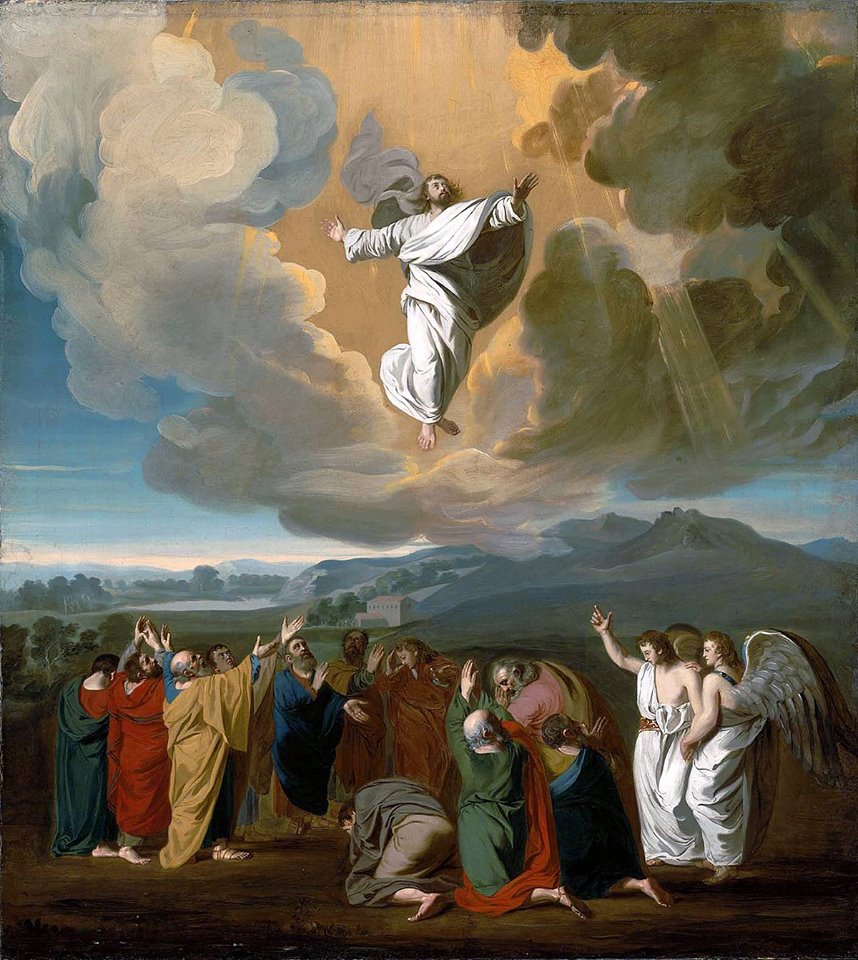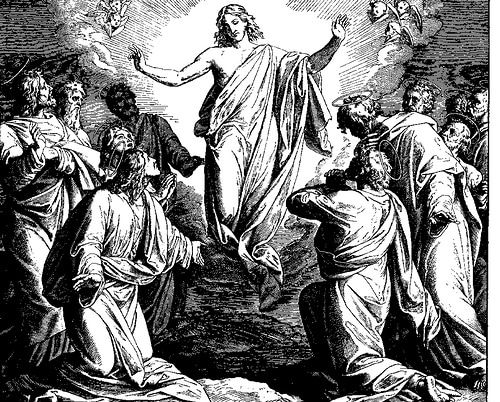44 Then he said to them, “These are my words that I spoke to you while I was still with you, that everything written about me in the Law of Moses and the Prophets and the Psalms must be fulfilled.” 45 Then he opened their minds to understand the Scriptures, 46 and said to them, “Thus it is written, that the Christ should suffer and on the third day rise from the dead, 47 and that repentance for the forgiveness of sins should be proclaimed in his name to all nations, beginning from Jerusalem.48 You are witnesses of these things. 49 And behold, I am sending the promise of my Father upon you. But stay in the city until you are clothed with power from on high.”
50 And he led them out as far as Bethany, and lifting up his hands he blessed them.51 While he blessed them, he parted from them and was carried up into heaven.52 And they worshiped him and returned to Jerusalem with great joy, 53 and were continually in the temple blessing God. ~Luke 24:44-53
Before Jesus ascended into heaven to sit at the right hand of God the Father Almighty, he preached one last sermon to his disciples. And in this sermon, he gave his Church instructions and promises concerning the mission of the Church during his physical absence. He did not leave his disciples without hope or promise. Rather, he gave them a rich treasure-trove and equipped them superabundantly for everything they would face on this earth.
Jesus explains to his disciples that everything he taught them came true: everything written about him in the Law of Moses and the Prophets and the Psalms were indeed fulfilled by Jesus. The Law of Moses, the Prophets and the Psalms make up the Old Testament. Jesus is saying that the entire Old Testament is about him. It prophesies of what Jesus would do. This means that Christ's suffering and death and resurrection on the third day vindicate the Old Testament. How do we know that the Old Testament is true? Well, Jesus fulfilled it! He died and rose from the dead, just as Scripture in many and various ways foretold (Hebrews 1:1).
Jesus tells his disciples that the Old Testament Scriptures have the authority of God. The Old Testament is an effective tool to reveal the truth of Jesus' death and resurrection for sinners, to preach repentance and forgiveness of sins, and turn hearts to God. The Apostles made good use of the Old Testament Scriptures and so does the Christian Church to this day.
Then Jesus says to his Apostles, "You are witnesses of these things." Here Jesus validates the authority of the New Testament. The New Testament is the collection of the writings and teachings of the Apostles, who were witnesses of Christ's death and resurrection. Jesus gives their teaching authority. And we believe from Scripture that the writings of the Apostles are from God and in fact God-breathed (2 Timothy 3:16). And so, we see in these final words spoken by Christ that he has established the Old and New Testaments as the authoritative Word of God, which teaches the truth of Jesus' death and resurrection. This is why we believe that the Bible is the Word of God and the only rule and norm according to which all teachings, together with all teachers, should be evaluated and judged. Jesus equipped his Church for her sojourning in this sinful world with the Bible. And no Christian or church can expect success if they reject what the Bible teaches.
Having equipped his Church with a priceless treasure, the Holy Scriptures, Jesus then gave his Church a command to preach repentance and forgiveness of sins in his name to all nations beginning from Jerusalem. The mission of Christ's Church is not a mystery. Nor is it up for debate. Every congregation and church ought to have the same mission: to preach repentance and forgiveness of sins in the name of Christ. Scripture says that God "desires all people to be saved and to come to the knowledge of the truth" (1 Timothy 2:4) and that there is salvation in no one else but Jesus, "for there is no other name under heaven given among men by which we must be saved." (Acts 4:12)
Jesus previously said to his disciples, "The harvest is plentiful, but the laborers are few. Therefore pray earnestly to the Lord of the harvest to send out laborers into his harvest." (Luke 10:2) It is the Lord's harvest. They are his Christians, whom he desires to gather to himself. The mission of the Church is to do the work of laborers. To plant and water and yet depend on God to do the growth. We do not have a right, nor is it wise, to change the strategy or mission of the Church. It is Christ's command that repentance and forgiveness be preached.
To preach repentance, you have to preach the Law. The Law is the love God commands of us, summarized in the Ten Commandments. The Law is good, because it reveals God's will to us. Yet, the Law shows us our sin, because we are sinful. It tells you that you don't love God as much as you should, but rather in many ways show hatred toward him. You don't love your neighbor as much as you should. You're selfish, unchaste, greedy, and untruthful. And all this from the mouth of God. This hurts. The preaching of the Law causes guilt, embarrassment, humility, and as St. Paul says, "death" (Romans 7; Galatians 2). Yet, as unpleasant as the preaching of the Law is to a heart racked with guilt and shame, it is necessary for repentance. And without repentance from sin, there can be no forgiveness nor salvation.
It is a divine mandate given by Christ himself that the Church continue to preach the full extent of the Law to lead sinners to repentance. Yet, this is for the expressed purpose of preaching the Gospel. St. Paul writes, "Woe to me if I do not preach the gospel!" (1 Corinthians 9:16) And "For I am not ashamed of the Gospel of Christ. For it is the power to salvation to all who believe, to the Jew first and also to the Greek." (Romans 1:16) Christ does not command the Church to preach the Law to no end. If the Church only preached the Law, then sinners would not be saved. They would either despair of any hope of salvation and curse God or become insufferable self-righteous hypocrites with a false faith in themselves; both of which lead to hell.
But the purpose of the Law is to prepare the soil for the Gospel. Only a person convicted of his sins can receive the Gospel. And indeed, the Gospel is the greatest treasure we have. Jesus has ascended to the Father, yet this is not sad news for us. He has ascended victorious, having won for us salvation and freedom from our bondage to sin, death, and the devil, as St. Paul writes in Ephesians 4, "When he ascended on high he led a host of captives." We are those captives set free by the blood of Christ. Jesus' enthronement at the Father's right hand means that his death and resurrection have accomplished everything necessary for our salvation. He now makes intercession for us before God the Father. That Jesus sits at the Father's right-hand demonstrates God's love for us, as Jesus still shares our human flesh and blood, which he took upon himself in the womb of the Virgin Mary.
Neither is Jesus far away from us. The right hand of the Father is no more a local place in the sense of Europe or America as heaven and hell are. You can't take an airplane or a space ship to heaven or to God's right hand. Rather, the right hand of God is an office of authority, which places Jesus above all things and all things under his feet. Jesus has unique power to rule the universe. And with such power, he is able to be with his Church even today. This is also why we believe that Christ Jesus is present with his body and blood in the bread and wine of the Lord's Supper. His human nature does not limit his divine glory.
Finally, Jesus gave his disciples the promise of his Father, the Holy Spirit. He had already promised the Holy Spirit on the night when he was betrayed. It is the Holy Spirit, who opens people's minds and hearts to understand and believe the Gospel. The Holy Spirit works through God's Word. This is why Jesus equipped his Church with the Holy Scriptures. The Holy Scriptures is the Holy Spirit's book. We should not assume that the Holy Spirit will work apart from the ministry of the Word from the Holy Scriptures. That is why Jesus connects the promise of the Holy Spirit with the command to preach the Gospel as it is taught in the Holy Scriptures.
We still have this promise today. Because we still have the command to preach the Gospel and we are still equipped with the Holy Scriptures. Although it is approaching two thousand years since Christ ascended into heaven, he still sends us the Promise of the Father, the very Holy Spirit, who creates faith and forgives sins through the preaching of the Gospel. Where there is the preaching of the Gospel, there is the Holy Spirit working. And where the Holy Spirit is working, there is Jesus with us. And Christ will continue to send this promised Holy Spirit to us until he returns in the same way in which he departed.
Let us remain in the temple of Christ's Word and Sacrament blessing God until that awesome day of Christ's return. Amen.


 RSS Feed
RSS Feed